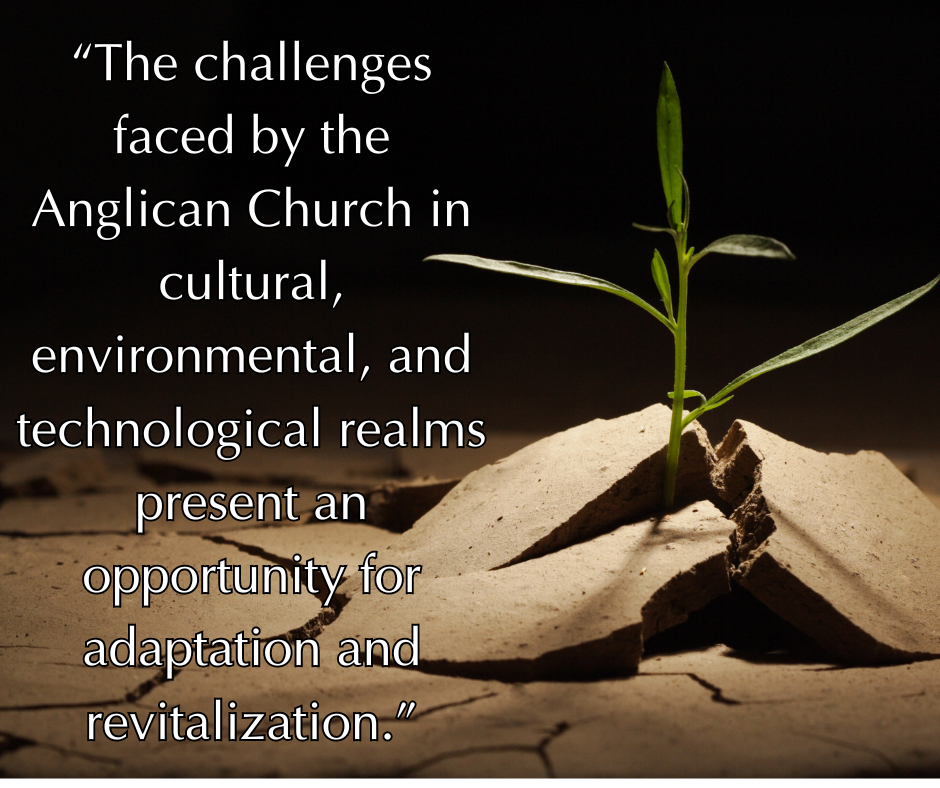The Anglican Church, like many organised religions, faces substantial challenges amidst ongoing cultural shifts. As societal values and norms evolve at a rapid pace, churches find themselves grappling to maintain relevance. The quest for authenticity, inclusivity, and flexibility, particularly among younger generations, poses a profound dilemma for institutionalised churches. Balancing deeply rooted beliefs with contemporary ideologies without compromising fundamental principles is an intricate and demanding task. While the church traditionally embraces change slowly to maintain a sense of continuity, when it cannot adapt to and reflect on social change as quickly as the rest of the world, it risks fading into obscurity and irrelevance. The tension between structured religion and the desire for individual autonomy in spiritual matters might lead to a shift towards more personalised and self-guided forms of faith exploration.
Moreover, environmental anxieties, particularly concerning climate change and resource depletion, hold a prominent place in the public consciousness. Some theological perspectives interpret these crises through an apocalyptic lens, prompting a widespread reconsideration of traditional religious frameworks. Should these environmental challenges escalate and lead to societal disruptions, organised religions, including Christianity, might undergo significant transformations, needing the exploration of new spiritual paths or alternative modes of worship.
In addition to environmental concerns, technological advancements, notably in artificial intelligence, raise profound philosophical and ethical questions that extend into religious domains. The integration of technology into daily life influences spiritual beliefs, challenging established norms. This technological disruption could potentially fuel a post-apocalyptic narrative for Christianity, wherein the convergence of technology and spirituality reshapes the landscape of organised religion.
However, within these formidable challenges lies an opportunity for a more resilient and adaptable form of Christianity. Post-apocalyptic scenarios often serve as catalysts for resilience and adaptation. Unfettered from institutional constraints, individuals might explore their faith in diverse and innovative ways, potentially inspiring a more inclusive Anglicanism that accommodates a broad spectrum of beliefs and practices.
A post-apocalyptic future could prompt a comprehensive reevaluation of core Christian values, placing a greater emphasis on the heart of spirituality rather than outward actions. Rather than simply being an institution people rely on in order to feel better about themselves, the Church could become a community in which Christians are strengthened for compassion, community, outreach, and service. This departure from institutional rituals might resonate profoundly with those who have become disillusioned by organised religion, fostering deeper and more personal spiritual connections.
Even, technological integration could facilitate a renewed Christian presence, nurturing online communities and digital platforms for worship and spiritual dialogue. These advancements transcend geographical boundaries, fostering global networks of believers engaged in mutual support and dialogue beyond the constraints of physical church structures.
A post-apocalyptic future could paradoxically serve as a catalyst for a revitalised Christianity. Jesus only promised that the gates of hell would not prevail against the Church, not against the institution. Beyond institutional boundaries, there lies the potential for a dynamic and inclusive faith community, adapting to the contemporary landscape while upholding the fundamentals of Anglican identity. The challenges faced by the Anglican Church in cultural, environmental, and technological realms present an opportunity for adaptation and revitalization. These shifts might prompt a more inclusive and resilient Christianity, embracing diversity and innovative spiritual expressions while remaining rooted in the core values of compassion, community, outreach, and service.


